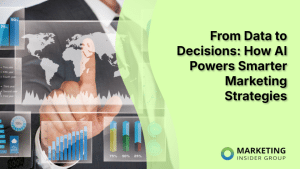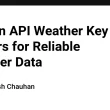
Marketers today are drowning in data. Google Analytics, social media metrics, CRM systems, email platforms, and advertising networks generate endless streams of information about customer behaviour, campaign performance, and market trends. Yet despite having access to more data than ever before, many marketing teams struggle to translate these insights into strategic decisions that drive meaningful results.
The challenge is not the availability of data but making sense of it all. Traditional reporting tools can tell you what happened, but they often fail to explain why it happened or predict what might happen next. This is where artificial intelligence steps in as a game-changer, transforming raw marketing data into actionable insights that power smarter strategies, improve campaign effectiveness, and deliver stronger ROI.
AI’s impact on marketing decision-making spans everything from predictive analytics and customer segmentation to real-time campaign optimisation and personalised content delivery. By automating complex data analysis and uncovering patterns human analysts might miss, AI is revolutionising how marketers approach strategy development and execution.
Why Data Alone Isn’t Enough
The explosion of digital touchpoints has created a perfect storm of information overload. Customers now interact with brands across dozens of channels including social media, email, websites, mobile apps, in-store experiences, and more. Each interaction generates valuable data, but this information often lives in silos across different platforms and systems.
Traditional marketing reporting tools, while useful for basic metrics, fall short when it comes to connecting the dots between disparate data sources. A typical marketing dashboard might show that email open rates rose modestly last month, or that social media engagement is up slightly. However, such dashboards often fall short of explaining why those changes occurred or predicting how they will affect future performance.
Furthermore, the sheer volume of available data can lead to analysis paralysis. Marketing teams spend countless hours generating reports and trying to identify trends manually, often missing critical insights buried within the noise. By the time human analysts spot emerging patterns, market conditions may have already shifted, rendering their findings less actionable.
This fragmented approach to data analysis creates blind spots in marketing strategy. Without a comprehensive understanding of how different channels and touchpoints influence customer behaviour, marketers struggle to allocate budgets effectively, personalise experiences at scale, or optimise campaigns in real-time. The result is often wasted spend, missed opportunities, and suboptimal customer experiences.
How AI Transforms Marketing Data into Insights
Artificial intelligence excels at processing vast amounts of complex data quickly and identifying patterns that would be impossible for humans to detect manually. In marketing contexts, AI transforms raw data into strategic insights through several key capabilities:
- Predictive Analytics forms the foundation of AI-powered marketing decision-making. Rather than simply reporting on past performance, machine learning algorithms analyse historical data to forecast future customer behaviour, campaign outcomes, and market trends. For example, predictive models can identify which leads are most likely to convert, when customers might be ready to make repeat purchases, or which content topics will resonate with specific audience segments. This foresight enables marketers to proactively adjust strategies rather than react to events after they occur.
- Sentiment Analysis provides unprecedented visibility into brand perception and customer satisfaction at scale. AI can analyse thousands of social media posts, reviews, and customer feedback in real-time, identifying shifts in sentiment that might indicate emerging issues or opportunities. This capability proves particularly valuable during product launches, crisis management, or when evaluating the effectiveness of brand messaging campaigns.
- Advanced Customer Segmentation moves beyond basic demographic categories to identify micro-audiences based on behavioural patterns, preferences, and lifecycle stages. AI algorithms can process multiple data dimensions such as purchase history, browsing behaviour, engagement patterns, and demographic information to create highly specific customer segments that enable personalised targeting strategies.
- Attribution Modelling addresses one of marketing’s most persistent challenges: understanding which touchpoints actually drive conversions. AI-powered attribution models can track complex customer journeys across multiple channels and devices, assigning appropriate credit to each interaction. This insight proves crucial for budget allocation decisions and campaign optimisation efforts.
Consider how organizations are already applying AI-driven analytics to email marketing. According to Forrester’s Total Economic Impact report, businesses using triggered, personalized email journeys achieved conversion rates ranging from 17-24%, significantly higher than generic campaigns. Similarly, Stonewall Kitchen applied predictive modelling to re-engage inactive subscribers, improving open rates by about 10% and conversions by 4%. These real-world outcomes demonstrate how AI insights translate into more relevant messaging, improved customer engagement, and reduced email fatigue.
What Are AI Agents and Why They Matter
Understanding what are AI agents in a marketing context requires recognising them as autonomous digital tools that can analyse data, make decisions, and take actions without constant human oversight. Unlike traditional marketing automation, which follows pre-programmed rules and workflows, AI agents can adapt their behaviour based on changing conditions and learning from new data.
These intelligent systems represent a significant evolution from conventional marketing tools. Traditional automation might send an email when a customer abandons their shopping cart, but an AI agent could analyse the customer’s browsing history, past purchase behaviour, and current market conditions to determine the optimal timing, content, and channel for re-engagement. The agent might decide to send a personalised discount via email to one customer whilst targeting another through social media advertising based on their individual preferences and likelihood to convert.
AI agents excel in several key marketing applications. They can make real-time content adjustments based on user behaviour, automatically swapping out images, headlines, or offers to maximise engagement. In paid advertising, these agents can shift budget allocations between campaigns and channels based on performance data, ensuring marketing spend flows toward the highest-performing opportunities.
One platform at the forefront of this shift is Creatio. Let’s take a closer look at how its AI agents are redefining what’s possible in modern marketing.
Practical Applications in Smarter Marketing Strategies
AI’s transformative impact becomes most apparent in practical marketing applications that directly influence strategy and performance. These implementations demonstrate how intelligent systems can enhance every aspect of modern marketing operations.
- Personalisation at Scale represents one of AI’s most powerful marketing applications. Rather than creating broad customer segments, AI can deliver individually tailored experiences to thousands or millions of customers simultaneously. E-commerce platforms use AI to generate personalised product recommendations, whilst content management systems can dynamically adjust website layouts, messaging, and offers based on individual visitor behaviour and preferences. This level of personalisation was previously impossible at scale but now drives significant improvements in engagement and conversion rates.
- Intelligent Ad Spend Allocation and Bid Optimisation ensures marketing budgets work harder and more efficiently. AI systems can analyse performance across multiple advertising platforms, automatically shifting spend toward channels and campaigns delivering the best results. These systems can adjust bids in real-time based on factors like time of day, device type, audience characteristics, and competitive dynamics. The result is reduced cost per acquisition and improved return on advertising spend.
- Enhanced Customer Journey Mapping and Campaign Timing leverages AI’s ability to process complex behavioural data to understand optimal touchpoints and timing. Machine learning algorithms can identify when customers are most receptive to specific messages, which channels they prefer at different stages of their journey, and how various touchpoints influence purchasing decisions. This insight enables marketers to orchestrate more effective multi-channel campaigns that guide customers smoothly through the conversion process.
- Risk Management and Waste Prevention help marketers avoid costly mistakes and optimise resource allocation. AI can identify underperforming channels, campaigns, or audience segments before they consume significant budget. These systems can also detect fraudulent traffic, brand safety issues, or compliance problems that might damage campaign effectiveness or brand reputation.
These applications work together to create a more intelligent, responsive marketing ecosystem where decisions are based on comprehensive data analysis rather than intuition or limited insights.
Challenges and Ethical Considerations
Whilst AI offers tremendous potential for marketing transformation, responsible implementation requires careful consideration of challenges and ethical implications that accompany these powerful technologies.
- Data Privacy and Compliance represent paramount concerns in an era of strengthening regulations like GDPR and CCPA. AI systems require substantial amounts of customer data to function effectively, but marketers must ensure this information is collected, stored, and used in compliance with privacy laws. This means implementing robust consent mechanisms, providing transparency about data usage, and ensuring customers can control how their information is utilised.
- Over-reliance on AI versus Human Judgement poses another significant risk. Whilst AI excels at processing data and identifying patterns, it cannot replace human creativity, intuition, and strategic thinking. Marketing strategies that rely too heavily on algorithmic decision-making may miss important contextual factors, cultural nuances, or creative opportunities that human marketers would naturally consider.
- Bias in AI-driven Decision-making can perpetuate or amplify existing inequalities in marketing practices. Machine learning algorithms learn from historical data, which may contain implicit biases that could lead to discriminatory targeting or messaging. Marketers must actively monitor AI systems for biased outcomes and implement safeguards to ensure fair and inclusive practices.
- Transparency and Explainability become crucial when AI systems make decisions that significantly impact marketing performance. Marketers need to understand why AI agents make specific recommendations or take certain actions to maintain strategic control and ensure decisions align with business objectives and brand values.
To address these challenges, marketers should implement AI gradually, maintaining human oversight of critical decisions whilst building internal expertise in AI technologies. Regular audits of AI system performance, bias testing, and clear governance policies help ensure responsible implementation that balances innovation with ethical considerations.
Conclusion
The transformation from data to decisions represents a fundamental shift in how modern marketers approach strategy development and execution. AI serves as the critical bridge between vast amounts of available data and actionable insights that drive meaningful business results.
By leveraging predictive analytics, advanced segmentation, real-time optimisation, and intelligent automation, AI enables marketers to make more informed decisions faster and at greater scale than ever before. The technology’s ability to identify patterns, predict outcomes, and optimise performance continuously creates opportunities for improved campaign effectiveness, better customer experiences, and stronger return on investment.
However, the most successful AI implementations recognise that artificial intelligence should complement rather than replace human creativity and strategic thinking. The best marketing strategies combine AI’s analytical power with human insight, ensuring that data-driven decisions align with brand values, customer needs, and creative vision.
As AI technologies continue to evolve, marketers who embrace these tools while maintaining focus on ethical implementation and human-centred strategy will gain significant competitive advantages. The key lies in adopting AI capabilities gradually, building internal expertise, and fostering a culture where data-driven decision-making enhances rather than replaces marketing intuition and creativity. In this balanced approach, AI becomes a powerful ally in the ongoing quest to understand customers better, deliver more relevant experiences, and achieve marketing objectives more effectively.




![combine-ga4-and-chatgpt-to-deliver-more-insightful-analytics-[step-by-step-instructions]](https://prodsens.live/wp-content/uploads/2024/07/25607-combine-ga4-and-chatgpt-to-deliver-more-insightful-analytics-step-by-step-instructions-380x250.png)
